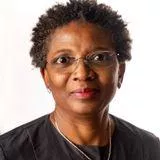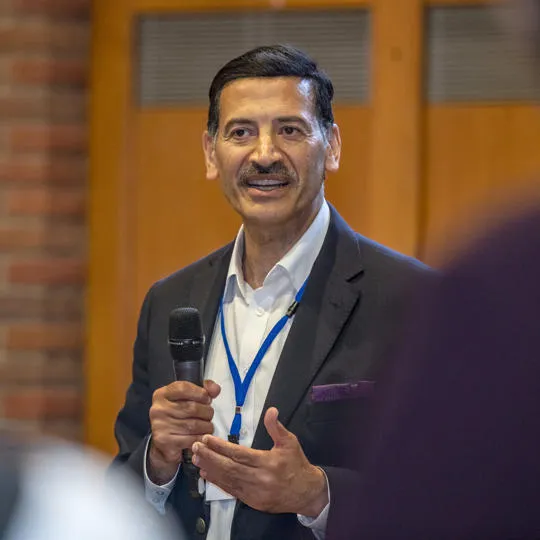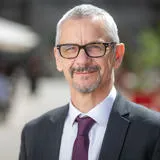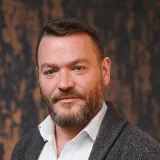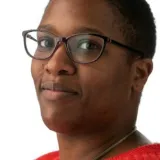We want to deploy all of our assets to serve society with the knowledge we produce with the talent we have here at King's.
Professor 'Funmi Olonisakin, Vice President (International, Engagement & Service)
18 January 2024
Winners announced at inaugural King's Engaged Research Awards ceremony
The inaugural King’s Engaged Research Awards ceremony brought together staff, students and community partners to celebrate public and community engagement with research at King’s.
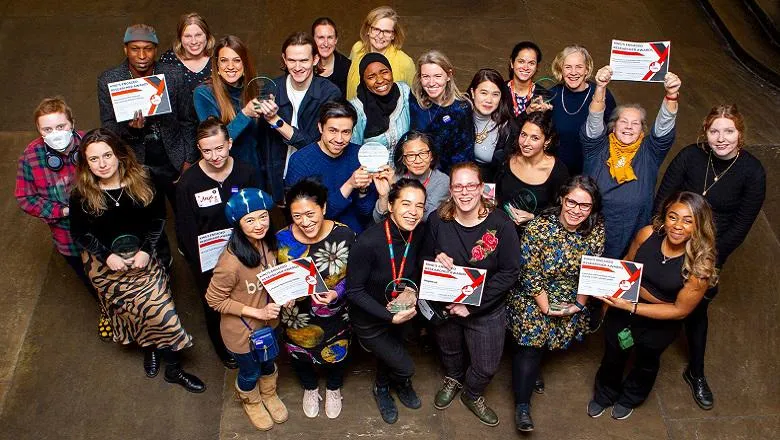
On 16 January 2024, over 130 staff, students, and community partners gathered at the Great Hall for the inaugural King’s Engaged Research Awards to celebrate best practice in public and community engagement with research at King’s.
The 11 winners, including teams of King’s staff and community partners, received awards in recognition of their outstanding achievements and contributions to impactful research. Each winner was presented with a certificate, trophy and £200. They were selected from a total of 86 nominations received by the KERN Working Group.
Created by King’s Engaged Researcher Network, the awards and ceremony contribute to efforts across the university to inspire new collaborations for impact at King’s in line with King’s Strategy 2026. The event follows the recent launch of King’s Impact Changemakers at Science Gallery London.
The ceremony was hosted by Professor 'Funmi Olonisakin, Vice President (International, Engagement & Service) and Professor Bashir M. Al-Hashimi, Vice President (Research & Innovation).
Public and community engagement is about bringing people together for mutual benefit. King's does a lot of this based on relevance and trust.
Professor Bashir M. Al-Hashimi, Vice President (Research & Innovation)
Presented by both King’s and community champions for public and community engagement with research, the awards covered five overarching categories showcasing excellence in engagement approaches with diverse audiences. These included subcategories linked to local, national and international work.
The categories were:
- Communicating Research - presented by Beatrice Pembroke, Executive Director of King’s Culture
- Collaboration - presented by Hamza Taouzzale, former Lord Mayor of Westminster
- Engaged Practice/Participatory Research - presented by Deanne Naula, Community Engagement Officer
- PhD and Early Career Research Award - presented by Sophie Langdon, KERN Co-ordinator and King’s PhD student
- Transforming Research Culture or Public Life - presented by Martin Broadstock, Head of Research Culture
See the full list of winners and shortlisted projects below:
COMMUNICATING RESEARCH
Local: D-Words
Faculty of Nursing Midwifery and Palliative Care, Cicely Saunders Institute
EMBED-Care colleagues from UCL, Dr Charlotte Kenten and Sophie Crawley and Public and Patient Involvement Members
The EMBED-Care team were selected for their work engaging young people about palliative dementia care research at a Science Museum event. For this event celebrating the 75th birthday of the NHS last July, the team developed a suite of activities, collectively named ‘the D words’. Visitors were invited to take part in activities including a card game, a wishing tree, and a myth buster quiz, as well as having the opportunity to chat to the research team about dying with dementia.
National: Samantha Terry
Faculty of Life Sciences and Medicine
Sam Terry has spent the past few years engaging audiences with her work around the radiobiology of molecular radiotherapy in cancer, creating new hands-on activities to explain the science. She has engaged a range of audiences for various purposes including school groups to inspire others into a career in STEM, and patient engagement projects to increase awareness of the latest research and to listen and learn from those with lived experience. Sam has employed various methods of communication including podcasts; festival stalls; school talks; community family days; blogs; social media platforms and taking part in PPI sessions.
International: Sentinels
Dickson Poon School of Law
Emily Barritt, Mark Knightley, Gabriela Eslava Bejarana
Sentinels is a short film telling the story of a group of young Colombians who went to court to halt deforestation in the Amazon. The film explores two themes central to Dr Barritt’s research: intergenerational climate litigation; and the recognition of legal rights for nature. The case was significant both because it contributed to the growing jurisprudence on intergenerational climate litigation, and because the judge granted the Amazon legal rights. Using a verbatim script complied from interviews conducted with the claimants, the film tells the story of the case, its global recognition, and its unhappy consequences.
COLLABORATION
Local: I, Human: Becoming Visible (IHBV)
Faculty of Arts and Humanities
Wing Fai Leung and Jonathan Gray, Diana Yeh, Moongate Productions, ESEA Online Community Hub
I, Human: Becoming Visible (IHBV) was a collaborative, creative project organised by King's College London; City, University of London and Moongate Productions, working with students, community members, performers and artists of East and Southeast Asian (ESEA) heritages. The IHBV project was conceived in response to anti-Asian racism that has seen a surge since Covid-19. It engendered a caring forum for ESEA communities to come together to celebrate, create and build resistance and solidarity.
National: Equitable partnerships: Power sharing in the cultural sector
King’s Business School
Andreana Drencheva, Rising Arts Agency
Initiated by an invitation from Rising Arts Agency, this co-created project investigated power imbalances between grassroots organisations/marginalised creatives and institutions. The insights from the project enabled Rising Arts Agency to make informed partnership decisions, better articulate their work, and resource an advocacy campaign. By prioritising marginalised perspectives, this project provides a pivotal roadmap for the cultural sector to build equitable partnerships that drive social change.
International: Decolonising Film Festivals and Curating African Cinemas
Faculty of Arts and Humanities
Estrella Sendra, Kadialy Kouyate - Film Africa (London), George Crosthwait and Labeja Kodua – The Garden Cinema, Amayel Ndiaye- Festival Films Femmes Afrique (Senegal), Leeds International Film Festival, Nadia Denton
Estrella Sendra (CMCI) has collaborated extensively with organisations such as Film Africa (London), The Garden Cinema (London), Festival Films Femmes Afrique (Senegal), the Leeds International Film Festival, and others in events and activities that promote African Cinema and African Film Festivals and strengthen existing and new collaborations between African film festivals, researchers, students and wider audiences beyond Higher Education.
ENGAGED PRACTICE/PARTICIPATORY RESEARCH
Local: Multimodal Participation in Neurodiversity Research
Institute of Psychiatry, Psychology & Neuroscience
Anne-Laure Le Cunff
Rather than limiting involvement to online discussions, this neurodiversity research project experimented with creative modes of participation such as inviting community advisory board into the lab to review the experiment and co-author a methods paper, as well as hosting a neurodivergent artist to document their experience as a research participant through mixed media art in collaboration with Neuroart. This multimodal approach unlocked insights that would not have emerged from traditional participatory methods alone, and allowed community stakeholders to become co-designers.
National: RE-STAR Youth Researcher Panel
Institute of Psychiatry, Psychology & Neuroscience
Susie Chandler and Tiegan Boyens on behalf of the panel.*
* The RE-STAR Youth Researcher Panel includes: Jordan Altimimi, Beta Balwani, Saskia Barnes, Tiegan Boyens, Zoe Glen, Cj Harris, Charlotte Hillman, Luke Harvey-Nguyen, Issy Jackson, Amber Johnson, Elisa Ly, Elizabeth Macauley, Maciej Matejko, Dorian Poulton, Anya Rose, Darren Webb, Archie Wilson.
The RE-STAR Youth Researcher Panel (Y-RP) is a group of young adults with a diagnosis of autism and/or ADHD who are co-producing a government-funded research project to find new ways of reducing depression in neurodivergent young people. Over the past two years, the Y-RP has contributed to every stage of the research process. For researchers, working with the Y-RP has been a transformative experience, challenging traditional paradigms and prompting a revaluation of their own neurodiversities and contributions to the research process.
International: Impetus
Faculty of Natural, Mathematical & Engineering Sciences
Dr Gefion Thuermer
Impetus enables diverse citizen science initiatives to access funding, brings citizen science closer to society and policy makers and enables citizen science projects to contribute to Green Deal and UN Sustainable Development Goal commitments. Impetus will fund and providing training for 125 citizen science initiatives, with a focus on initiatives that are led by women or non-binary persons, and that are run by, or actively involve, underrepresented groups.
PhD AND EARLY CAREER RESEARCH AWARD
Phoebe Reynolds
Institute of Psychiatry, Psychology & Neuroscience
Phoebe Reynolds was selected for her innovative work in science communication and public engagement in the Centre for Developmental Neurobiology, where she uses creative practice including stand-up comedy and pantomime to engage diverse audiences with neurobiology research, make science accessible and foster the next generation of researchers.
TRANSFORMING RESEARCH CULTURE OR PUBLIC LIFE
Implementing a co-developed public involvement strategy for palliative care research
Faculty of Nursing Midwifery and Palliative Care, Cicely Saunders Institute Public Involvement team
Lived experience experts: Margaret Ogden, Rashmi Kumar, Pam Smith, Marion Sumerfield, Alan Quarterman
King’s staff: Lisa Brighton, Sarah Crabtree, Beka Torlay, Cat Harvey, Halle Johnson, India Tunnard, Tofunmi Aworinde, Jo Bayly, Joana Goodrich, Juliet Gillam, Monica Oancea, Steve Marshall, Catherine Evans
This group of researchers and lived expert members co-developed and implemented a Public Involvement Strategy to strengthen meaningful collaboration with lived experts and community partners, and enrich research at the Cicely Saunders Institute. The strategy has ensured that public involvement is at the core of the institutes research culture, has led to increased diversity of members involved, increased influence at a strategic level and partnerships with other organisations to build local, national and international capacity in public involvement in palliative care.
See below images from the night including winners and shortlisted teams:
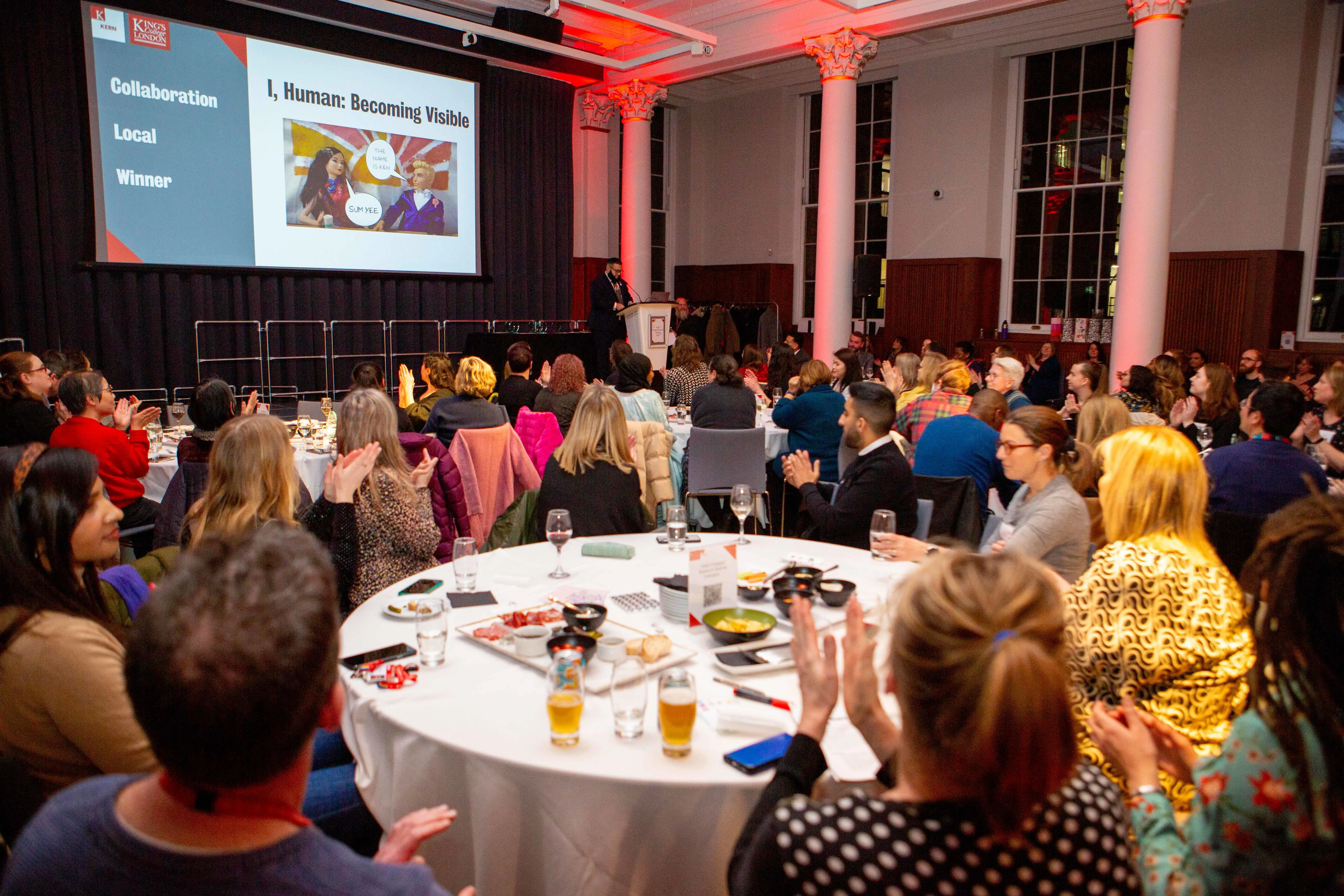
See the full programme and read more about each shortlisted project here.
For more information about the awards, please contact King's Engaged Researcher Network at kern@kcl.ac.uk.
Find out more about King's Engaged Researcher Network
King’s Engaged Researcher Network (KERN) is an exciting collaboration, launched in late 2016. We foster a growing community of King’s staff and students interested in developing sharing and celebrating their public engagement practices.
Sign up to the newsletter and find out more about how KERN helps to contribute to our vision of public and community engagement with research at King's here.
In this story
Related departments
- Faculty of Arts & Humanities
- King’s Business School
- Faculty of Dentistry, Oral & Craniofacial Sciences
- The Dickson Poon School of Law
- Faculty of Life Sciences & Medicine
- Faculty of Natural, Mathematical & Engineering Sciences
- Florence Nightingale Faculty of Nursing, Midwifery & Palliative Care
- Institute of Psychiatry, Psychology & Neuroscience
- Faculty of Social Science & Public Policy
- King’s Culture
- Service at King’s
- King’s & London
- Global
- International

